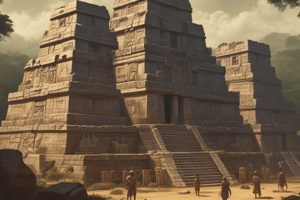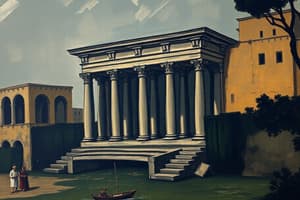Podcast
Questions and Answers
What is the earliest form of continuous social organization mentioned?
What is the earliest form of continuous social organization mentioned?
- State
- Tribe
- Clan (correct)
- Chiefdom
Which social structure is described as a group of clans united under the same chief?
Which social structure is described as a group of clans united under the same chief?
- Tribe (correct)
- Clan
- State
- Society
What was the primary limitation of chiefs in primitive societies?
What was the primary limitation of chiefs in primitive societies?
- Their authority was absolute at all times.
- They could not lead in war.
- Their power could be revoked by tribal elders. (correct)
- They governed without consultation.
Which factor contributed to the growth of slavery in primitive societies?
Which factor contributed to the growth of slavery in primitive societies?
What is one characteristic of primitive government systems?
What is one characteristic of primitive government systems?
Why were 'happy hunting grounds' significant in conflict among primitive societies?
Why were 'happy hunting grounds' significant in conflict among primitive societies?
In what situation did tribal elders have the ability to revoke a chief's power?
In what situation did tribal elders have the ability to revoke a chief's power?
Which form of governance did primitive societies primarily rely on during crises?
Which form of governance did primitive societies primarily rely on during crises?
What mainly motivated farmers to fight for land?
What mainly motivated farmers to fight for land?
What does Nietzsche suggest as the origin of the state?
What does Nietzsche suggest as the origin of the state?
In what way did war contribute to the development of the state?
In what way did war contribute to the development of the state?
What role did law play in the existence of the state?
What role did law play in the existence of the state?
What is cited as an early form of justice before formal law developed?
What is cited as an early form of justice before formal law developed?
What was the primary focus of conflict among herders?
What was the primary focus of conflict among herders?
According to Oppenheimer, what often accompanies the conquest of one race by another?
According to Oppenheimer, what often accompanies the conquest of one race by another?
How is the transition from tribal organization to state organization characterized?
How is the transition from tribal organization to state organization characterized?
What is a key element that differentiates civilized societies from tribal societies?
What is a key element that differentiates civilized societies from tribal societies?
Which of the following is considered a biological condition that supports civilization?
Which of the following is considered a biological condition that supports civilization?
Which societal structure was present in ancient Egypt?
Which societal structure was present in ancient Egypt?
What is considered the first form of culture that enabled the transition from tribal to state organization?
What is considered the first form of culture that enabled the transition from tribal to state organization?
How do geological conditions impact the development of civilizations?
How do geological conditions impact the development of civilizations?
Which of the following is a prerequisite for the development of industry within a civilization?
Which of the following is a prerequisite for the development of industry within a civilization?
What role did imitation of animals have in the development of human civilization?
What role did imitation of animals have in the development of human civilization?
Which of the following reflects moral elements in the context of civilization?
Which of the following reflects moral elements in the context of civilization?
Flashcards
Primitive Communism
Primitive Communism
An early form of society where resources and goods were shared communally.
Causes of disappearance of primitive communism
Causes of disappearance of primitive communism
Factors that led to the end of primitive communism, such as the introduction of private property and trade.
Origins of private property
Origins of private property
The beginning of the concept of things belonging to individuals or families.
Slavery
Slavery
Signup and view all the flashcards
Social Classes
Social Classes
Signup and view all the flashcards
Clan
Clan
Signup and view all the flashcards
Tribe
Tribe
Signup and view all the flashcards
Primitive Government
Primitive Government
Signup and view all the flashcards
Herders vs. Tillers
Herders vs. Tillers
Signup and view all the flashcards
War's Purpose
War's Purpose
Signup and view all the flashcards
War's Results
War's Results
Signup and view all the flashcards
State Origins – Nietzsche
State Origins – Nietzsche
Signup and view all the flashcards
State Origins – Ward
State Origins – Ward
Signup and view all the flashcards
State Origins – Oppenheimer
State Origins – Oppenheimer
Signup and view all the flashcards
State Origins – Ratzenhofer
State Origins – Ratzenhofer
Signup and view all the flashcards
State and Law
State and Law
Signup and view all the flashcards
Civilization's Origin
Civilization's Origin
Signup and view all the flashcards
Civilization's Characteristics
Civilization's Characteristics
Signup and view all the flashcards
Geological Impact on Civilization
Geological Impact on Civilization
Signup and view all the flashcards
Geographical Factors for Civilization
Geographical Factors for Civilization
Signup and view all the flashcards
Agriculture's Role in Civilization
Agriculture's Role in Civilization
Signup and view all the flashcards
Economic Elements of Civilization
Economic Elements of Civilization
Signup and view all the flashcards
Industry's Foundations
Industry's Foundations
Signup and view all the flashcards
Humans as Toolmakers
Humans as Toolmakers
Signup and view all the flashcards
Study Notes
Origins of Civilization
- The word "civilization" derives from the Latin word "civilis," meaning related to citizens, based on "civis" and "civitas" (city).
- In classical times, "civilized" distinguished people from savages, barbarians, and primitive peoples.
- Modern contexts contrast civilized people with indigenous peoples and tribal societies.
- Civilization is a developed society where people's knowledge, culture, and technology advance, including improvements in art, science, writing, record-keeping, and organized social structures like governments.
Elements of Civilization
- Geological conditions:
- Geological events like volcanoes, earthquakes, and tsunamis have shaped human history and often led to the decline of cities.
- Geographical conditions:
- Wealth of resources, fertile soil, and water location are key.
- Economic conditions:
- Agriculture was the first form of culture, providing a reliable water and food supply enabling settlements.
- This enabled men to build their huts, temples, and schools. They also invented productive tools.
- Biological conditions:
- Homogenous people from the same race. Factors include Mental, Economic, and Political elements.
- Agriculture, economic organization, and industry contribute significantly to civilization.
Foundation of Industry
- Industry: Involves fire, primitive tools, weaving, pottery, buildings, transport, and trade/finance.
- Humans' ingenuity stems from imitating animal behaviors (monkeys, beavers, birds, chimpanzees).
- Humans developed tools and weapons to compete with the strength of animals.
Economic Organization
- Early Economic Organization:
- The transition from shared land and food to private property, from tribal to family property, marked a change
- Trade and Private Property:
- Trade significantly altered primitive societies by introducing money, profit, and the concept of private property.
- This shift led to the development of government structures.
- Before trade, there was little property and economic development was limited.
- Agriculture and Slavery:
- Agriculture led to slavery, as the rich used the poor as labor, creating social classes.
Origins of Government
- Early Societies:
- Early white travelers in Africa observed communal sharing of gifts.
- Primitive societies were often kinder and lacked a strong concept of personal property.
- Sumner argued that communism hindered progress in creativity, hard work, and reward for capability.
- Concept of Government:
- Government, state, law, and family structure evolved.
- Force and conflict between groups was and remain part of human history and societies.
- The origin of the state stems from a strong, organized group of conquerors controlling a larger, weaker population.
- The state began when conquerors took control of a larger, weaker population using force.
Defining the State from a Tribal Organization
- The state, distinct from tribal organization, emerged with the conquest of one race by another.
- Warlike tribes broke through boundaries of other groups.
- War led to the formation of states, with property evolving as the mother, and war as the father.
- The state emerged relatively late in history, after the establishment of written record.
Law and State
- States requiring use of force alone would quickly lose control or power.
- Law emerged to solidify and help govern society in addition to the control of resources.
- Basic legal frameworks are often established early in the growth of a unified civilization.
- Some simple societies managed without formal law, relying on public opinion in groups.
Moral Elements
- Conventions and Customs:
- Conventions are behaviors a group finds valuable. Customs are passed down through generations.
- Morality, shaped through generations, addresses right and wrong and how individuals treat each other. Morality allows people to function and work together in groups.
- Conscience and Morality:
- Darwin saw conscience as a key difference between humans and animals.
- Morality entails individuals working together for the overall good. This is essential in shaping a functional society or civilization.
Studying That Suits You
Use AI to generate personalized quizzes and flashcards to suit your learning preferences.




